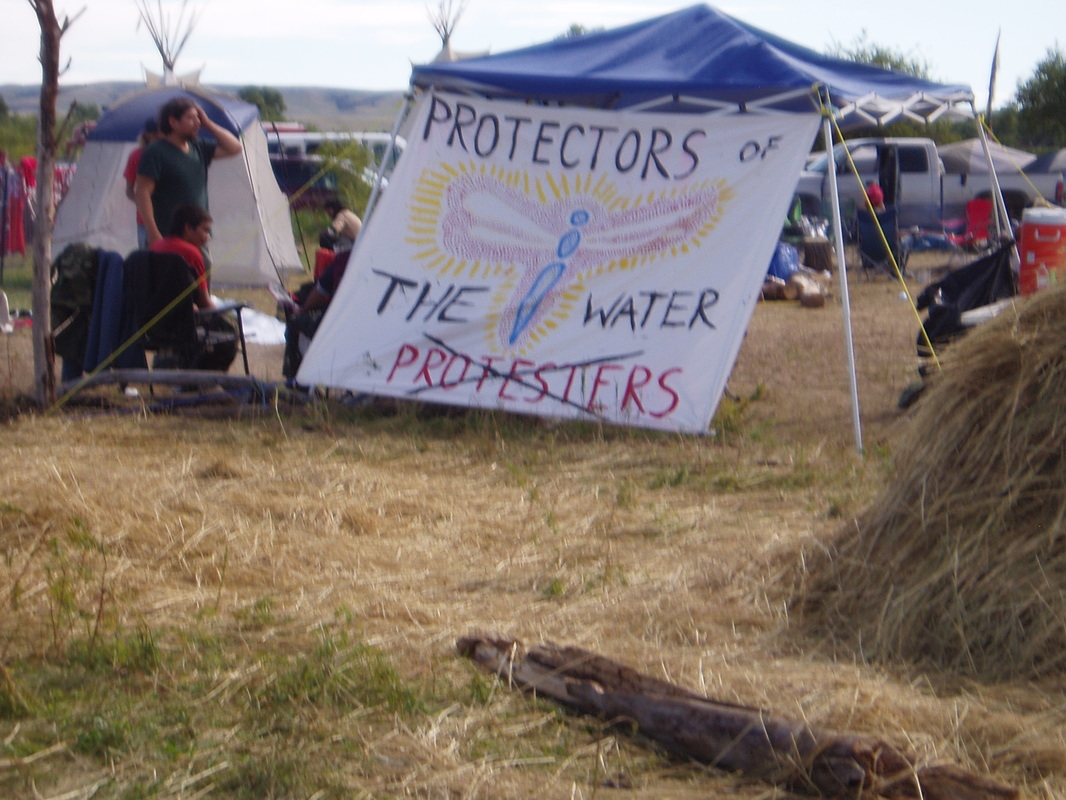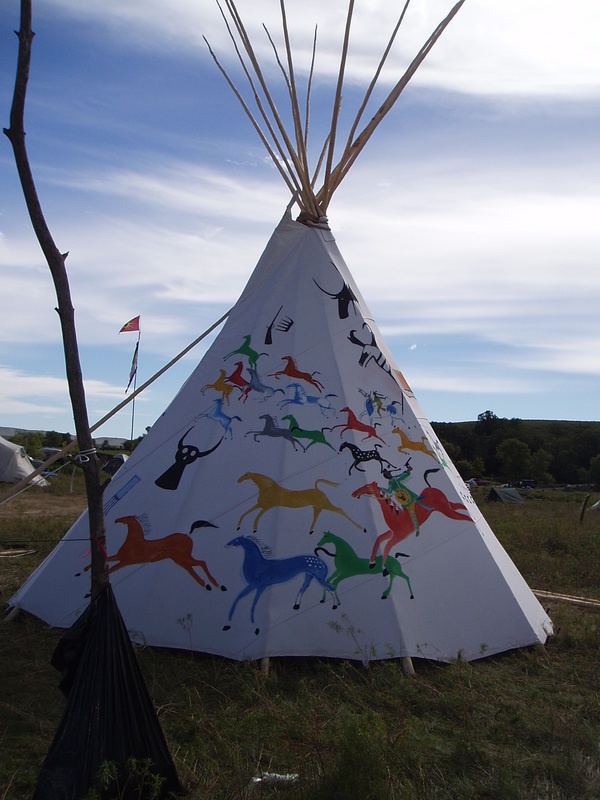|
On October 24-25 I will be at Standing Rock, in solidarity with the tribes. I will be there because our Synod’s Apology pledged us to stand with the tribes, and I will be there because the Repudiation of the Doctrine of Discovery did the same. You can find an interfaith statement signed by the ELCA on our web page. Below is a presentation I did for the Conference of Bishops on St. Francis Day, last week. Langston Hughes wrote: I’ve known rivers: I’ve known rivers ancient as the world and older than the flow of human blood in human veins My soul has grown deep like the rivers. I bathed in the Euphrates when dawns were young. I built my hut near the Congo and it lulled me to sleep. I looked upon the Nile and raised the pyramids above it. I heard the singing on the Mississippi when Abe Lincoln went down to New Orleans, and I’ve Seen its muddy bosom turn all golden in the sunset. I’ve known rivers: Ancient, dusky rivers. My soul has grown deep like the rivers. I grew up along the Susquehanna River in Pennsylvania. I spent my twenties by the Charles River in Massachusetts. Now I live 2 blocks from the mighty Missouri River, the river that starts in the mountains, eventually joins the Mississippi, and forms the longest water way in North America. The synod where I am privileged to serve has the backbone of the continent .Waters flow to the east to make up the Missouri and the Mississippi. And waters flow to the west to make up the Columbia River. In 2001 the Catholic Bishops of the Columbia watershed in both the US and Canada wrote an International pastoral letter about the Columbia, care of creation, and respect for indigenous people’s rights along the river. In the last several years there has been a move to re-negotiate some of the agreements, to be more fair to the native peoples. Listen to parts of Riversong, a poetic reflection on the pastoral letter. In the beginning was the Word, who brought forth the cosmos, Creating the stars and the worlds and the waters, A universe wondrous, dynamic and blessed. The Spirit breathed spirit enlivening the cosmos: Over eons in waters the first life was born, Then evolved yet new creatures, sent to air, onto land: The finned ones and winged ones, the rooted ones and legged ones All that had life emerged on the earth To give life in turn, passing through generations, Diverse forms of beauty spread over the world. God said all creation was now “very good.” Then the Word who created the worlds and the waters And the wondrous lives in them, came into this world; Was immersed in womb waters, was born among people; In the Jordan was baptized , living waters poured on him; Came to teach us as Word by his words and life Came to tell us that we among creatures were called -as images, dreamers, aware of creation- To drink living waters of earth and the Spirit To care for each other, all life and our home. The Word spoke of water as living and flowing; The grace of the Spirit called all to be one: A sharing of goods and a life of compassion A way to see all as our neighbors to love. Two weeks ago today the Chippewa Cree tribes had a gathering on the banks of the Missouri River close to where I live. The name of the gathering was “Nipiy Oma Pimahtisiwin”, Water is Life. The event was in support of the Standing Rock Sioux, in support of the river. I went, and invited others to join me, because our Synod has pledged to stand with the tribes. I went because we repudiated the Doctrine of Discovery and this was a concrete way to live that out. I was asked to pray, along with tribal elders and spiritual leaders. We sent our prayers and good wishes downstream to the brothers and sisters at Standing Rock, along with the tobacco. You could say we were being church for the sake of the world.
The Anglicans in Canada—both the Archbishop and the National Indigenous Bishop have issued a letter of support. They call for prayer, writing: “Water is sacred and one of the four primal elements that sustain life on Mother Earth. We have not respected water, and consequently many lakes, streams, rivers and creeks are polluted. It is an element on the verge of scarcity. We must protect water. “ They conclude: “We call the Church to pray for Standing Rock, for Good Minds to prevail, and for peaceful settlement. We also call the Church to pray for water, that is taken for granted in many of our communities but good water is getting scarce in our communities. We call upon the Church to pray for our governments, both Indigenous and Settler, that they may work together to protect our fragile Mother Earth. Flowing waters are the arteries of our Creator, precious and life giving. Without water there is no life here on Mother Earth. Pray that our Creator, God, will help us to live in balance and harmony with each other and with Earth, Fire, Air and Water.” For more than 5 centuries, Europeans have infiltrated the Americas, attempting to conquer the people who were already there, and taking their land and destroying their way of life. Five hundred years—that’s longer than the Israelites were slaves in Egypt. And was all justified by a religious doctrine—one which we formally repudiated. In many of our synods. And at the Churchwide Assembly. Not even 2 months ago. Robert Allen Warrior, in his article “Canaanites, Cowboys and Indians,” ( Deliverance, Conquest and Liberation Theology Today) writes: “First, the Canaanites should be at the center of Christian theological reflection and political action. They are the last remaining ignored voice in the text, except perhaps for the land itself.” He goes on: “No matter what we do, the conquest narratives will remain. As long as people believe in the Yahweh of deliverance, the world will not be safe from Yahweh the conqueror. But perhaps, if they are true to their struggle, people will be able to achieve what Yahweh’s chosen people in the past have not: a society of people delivered from oppression who are not so afraid of becoming victims again that they become oppressors themselves, a society where the original inhabitants can become something other than subjects to be converted to a better way of life or adversaries who provide cannon fodder for a nation’s militaristic pride.” The Columbia River statement sets out 10 considerations for caring for the earth and the River. Number 4 is “Respect the dignity and traditions of the Region’s Indigenous Peoples.” “ The indigenous peoples have a wealth of spirituality, culture and traditions that call forth a need for appropriate respect and preservation. We are brothers and sisters in God’s creation, and we are grateful to the First Nations and the Native Americans for the lessons they teach about respect for nature. We apologize for cultural insensitivity do lack of Justice both past and present.” “ Today we extend an offer of peace and friendship to native peoples of our region. We pledge to work with them to seek equitable resolutions of conflicts over treaty rights, to work with them to enhance their engagement with other cultures , to foster their economic development and to participate with them to care for creation. We call upon members of our parish communities, government officials, those with economic interests and the general public to join in these efforts.” This is not just about the Columbia. It's not just about the Pacific Northwest tribes. It's about all of God’s creation, and all of God’s people. It's about the Missouri, and the Standing Rock Sioux. To whom we made a promise. Nipiy Oma Pimahtisiwin . Water is life. God saw living waters and peoples who cared for them, Sharing the life of the cosmos and commons -the tree of life gave the its fruits for their food Its leaves were their medicine, healing for all- The Riversong soared,then on wind, over waves God blessed them, saying to them, “You are all very good.” Nipiy Oma Pimahtisiwin . Water is life. Amen.
6 Comments
Frank
10/15/2016 07:22:50 am
Once I again, I wish that you Bishop Cristina would keep the church out of politics. If you want to go to help the pipeline protest as a stand alone person, fine. But going as the ELCA is causing much division in our church. There are many of us in the ELCA that do not agree with your political or environmental views. I don't believe that is your intent to cause division in the church.
Reply
Linda Hamel
10/30/2016 12:20:46 am
Frank,
Reply
Linda Hamel
10/30/2016 12:21:02 am
Frank,
Reply
Linda Hamel
10/30/2016 12:21:21 am
Frank,
Reply
Linda Hamel
10/30/2016 12:26:00 am
Frank,
Reply
Linda Hamel
10/30/2016 12:27:10 am
Frank,
Reply
Leave a Reply. |
Bishop Jessica Crist
Bishop of the Montana Synod of the ELCA Archives
August 2019
Categories |

